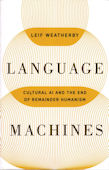Looking at the emergence of generative AI,
Language Machines presents a new theory of meaning in language and computation,
arguing that humanistic scholarship misconstrues how large language models (LLMs) function.
Leif Weatherby sees LLMs as a convergence of computation and language,
and he contends that AI does not simulate cognition, as widely believed, but rather creates culture.
This evolution in language, he finds, is one that we are ill-prepared to evaluate
without drawing on established theories of representation
that include both the human and the machine.
Locating the output of LLMs on a spectrum from poetry to ideology,
Weatherby asserts that literary theory must be the backbone of
a new rhetorical training for our linguistic-computational culture.
[review copy]
